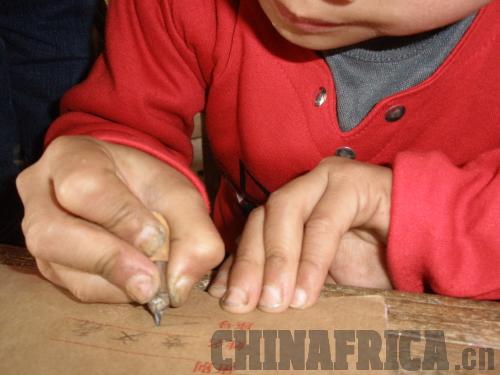|
 |
|
BASIC: A rural student struggles with a pencil stub (LI MINLAN) |
Better teachers
Almost all the volunteer teachers who have been to impoverished regions in west China believe that the lack of qualified teachers is a grave challenge facing primary schools in the region. Wang Dewei is an English teacher from Tianjin Municipality. In 2002, he went to Gansu Province as a volunteer in a junior middle school in Zhangjiachuan County of Tianshui City for two years. "These schools are in urgent need of teachers," he told Xinhua News Agency.
Wang taught three classes and each class had 90 to 117 students. In Tianjin, a general class has only 40 students, while a small class has only 20.
According to Wang, some primary schools had only one or two teachers. These teachers had to teach all subjects such as Chinese, math, English, music and P.E.
In 2003, China decided to encourage university graduates to teach in western impoverished regions, usually for a two-year period. After this time these graduates can get preferential policies to further their studies.
"Every year, we organize about 10 graduates going to the western region as volunteers. Meanwhile, we also have some graduates who go to the impoverished western regions to teach by themselves," Deng Yanlei, Deputy Secretary of the CYL Committee of Capital Normal University in Beijing, told ChinAfrica. CYL committees in various universities are the departments in charge of the program for selecting graduates to the west.
"I think this program is good for both the graduates and the schools in western China," said Deng. "On the one hand, the program can provide a good opportunity for our graduates to widen their horizon and practice what they have learned in universities; on the other hand, those impoverished schools can have well educated teachers."
Getting involved
Li Minlan came to Dahua Yao Autonomous Region as a teacher via the program. In 2008, she graduated from Yulin Normal University in Guangxi Zhuang Autonomous Region and applied to work as a volunteer in Dahua.
Deeply impressed by what she saw, she almost visited the families of all her students to learn more about local situation. "These children, though impoverished, are eager to go to school and leave their mountain home," she told ChinAfrica. Li said her students have to do housework and farm work after school every day unlike their urban counterparts.
When her two-year service ended in 2010, she stayed with her students and gave up the preferential policies to further her studies.
In July 2010, she established the Wild Lily Foundation in Dahua to raise finance to help her students and other students in impoverished areas. "I want to make the assistance programs sustainable."
She also set up a website for the foundation to publicize the acceptance and utilization of donations.
Although she can only raise 30,000 yuan ($4,620) a year, far short of her 500,000 yuan ($77,041) annual target, Li is determined to use the limited funds as effectively as possible.
"The government has done a lot to help students in west China, but definitely not enough. We need efforts from all members of society," she said. |